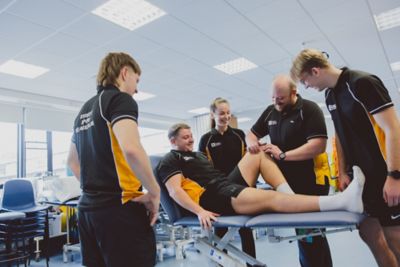*For full details including fees for part-time students and reduced fees during your time studying abroad or on placement (where applicable), see our fees page.
If you are a student from the EU, EEA or Switzerland, you may be asked to complete a fee status questionnaire and your answers will be assessed using guidance issued by the UK Council for International Student Affairs (UKCISA) .
Additional costs
As a student on this course, you should factor some additional costs into your budget, alongside your tuition fees and living expenses. This includes around £30 for skeleton hire (please note skeleton hire is optional) and the costs of purchasing suitable sport clothing, such as trainers and swimwear, for practical sessions.
You are provided with a uniform to wear in practice placements however you may wish to purchase additional items.
You should be able to access most of the books needed through our libraries, though you may wish to purchase your own copies.
Travel to your placements is self-funded and costs will vary depending on location. However, you may be eligible to reimburse some of your travel and accommodation costs while on placement.
Please note that these figures are approximate and subject to change.
Scholarships and bursaries
International students
We offer a range of international undergraduate scholarships for high-achieving international applicants who can put their Nottingham degree to great use in their careers.
Sports Scholarships
Full details of these can be found here.
Tuition fees 2026/27 (UK undergraduate students)
This is the UK undergraduate tuition fee for the academic year 25/26. It may increase for the academic year 26/27 and we will update our information once we have received confirmation of the fee from the UK Government.
*For full details including fees for part-time students and reduced fees during your time studying abroad or on placement (where applicable), see our fees page.
If you are a student from the EU, EEA or Switzerland, you may be asked to complete a fee status questionnaire and your answers will be assessed using guidance issued by the UK Council for International Student Affairs (UKCISA) .
Additional costs
As a student on this course, you should factor some additional costs into your budget, alongside your tuition fees and living expenses. This includes the costs of purchasing sport clothing, such as trainers and swimwear, for practical sessions.
You are provided with a uniform to wear in practice placements however you may wish to purchase additional items.
You should be able to access most of the books needed through our libraries, though you may wish to purchase your own copies.
Travel to your placements is self-funded and costs will vary depending on location.
Please note that these figures are approximate and subject to change.
Scholarships and bursaries
Home students*
Over one third of our UK students receive our means-tested core bursary, worth up to £1,000 a year. Full details can be found on our financial support pages.
* A 'home' student is one who meets certain UK residence criteria. These are the same criteria as apply to eligibility for home funding from Student Finance.
Sports Scholarships
Full details of these can be found here.






